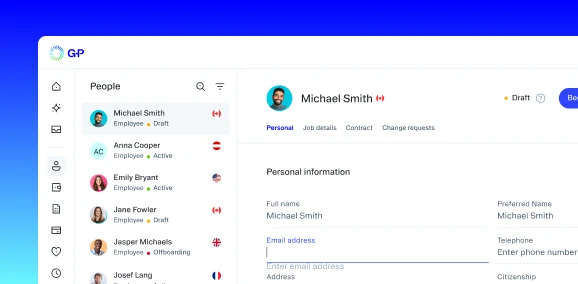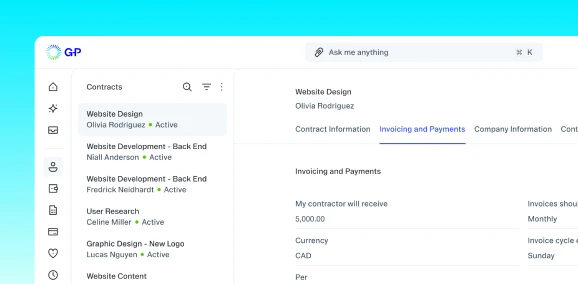France is the largest country in the EU. It has the third biggest economy in Europe and a GDP of approximately EUR 18T. The country has a highly skilled talent pool in the aerospace, automotive, and agri-food and wine industries.
Before expanding into France, you’ll need to understand contracts, taxes, wages, benefits, and other employment laws. Our guide will tell you everything you need to know about hiring in France.
What to know before hiring in France
If you’re expanding your business into France for the first time, there are important legal requirements to be aware of. These norms and laws influence hiring practices in France and many aspects of the employer-employee relationship, including compensation and benefits.
G-P Gia™, our AI-powered global HR agent, can answer your toughest compliance questions across 50 countries — including France — and all 50 U.S. states. Reduce your reliance on outside counsel and cut the time and cost of compliance by up to 95% with Gia.
Here are five things to know about hiring in France.
1. Collective Bargaining Agreements (CBAs) in France
CBAs are common in France. These agreements are made between labor unions and employers. They cover working conditions and benefits. CBAs can apply to one company, a group of companies, or even an entire industry.
CBAs can apply to your company even if you're not part of an employer's association. Before hiring in France, check to see if a CBA applies to your industry.

2. Working hours and minimum wage in France
In France, a standard workweek is 35 hours. Employees can't work:
-
10+ hours daily
-
48+ hours weekly
-
44+ hours per week averaged over a consecutive 12-week period
Employees get an 11-hour daily rest period and a 35-hour weekly rest period. After six hours of work, a 20-minute break is required.
Overtime is anything over 35 hours per week. The first eight overtime hours are paid at 125%. Any hours after that are paid at 150%. CBAs can set higher rates, but never less than a 10% premium. The overtime limit is 220 hours per employee annually. CBAs can change these limits and overtime pay rules.
As of 2025, the national minimum wage in France is EUR 1,801.80 per month. CBAs can set a higher minimum wage. Employees in France are paid once at the end of each month.
3. Paid leave and holidays in France
Employees get at least five weeks of paid vacation annually. More time off is possible based on seniority or CBAs.
France has 11 national holidays. Labor Day on May 1 is the only compulsory national holiday that all employees get off. However, in practice, these are negotiated by CBAs and most employees get all 11 national holidays off:
-
New Year's Day
-
Easter Monday
-
Labor Day
-
Victory in Europe Day
-
Ascension Day
-
Whit Monday
-
Bastille Day
-
Assumption Day
-
All Saints' Day
-
Armistice Day
-
Christmas Day
If sick, employees need a doctor's note within 48 hours. Without one, it’s unjustified leave. Sick pay usually starts on the fourth day. Both social security and the employer cover sick pay. The amount is based on length of service.
4. Maternity and paternity leave in France
All pregnant employees are entitled to maternity leave, regardless of contract type or length of service.
-
For the first or second child: 16 weeks (6 weeks before birth and 10 weeks after)
-
For the third child or more: 26 weeks (8 before and 18 after)
-
For twins: 34 weeks (12 before and 22 after)
-
For triplets or more: 46 weeks (24 before and 22 after)
French Social Security (CPAM) pays maternity leave allowances. Dismissal protection applies from the moment the employer is notified of the pregnancy, throughout maternity leave, and for 10 weeks after return.
Fathers or second parents (including spouses, PACS (pacte civil de solidarité) partners, or cohabiting partners) get.
-
Three working days of birth leave paid by the employer
-
25 calendar days of paternity and childcare leave (32 for multiple births) paid by Social Security
The first four days of paternity leave are mandatory and must follow the birth leave. The remaining days can be split into two periods of at least five days each. They must be taken within six months of the birth.
Either parent with at least one year of service at the time of birth or adoption can take parental leave. Parental leave is for up to one year and can be renewed twice until the child’s third birthday or three years after adoption. Parental leave is usually unpaid.
5. Taxes and social welfare programs in France
France has a progressive income tax system, meaning higher earners pay a larger percentage of their income in taxes. Employers deduct this tax from employees' paychecks.
Employees and employers contribute to France's comprehensive social security system. This covers healthcare, family benefits, unemployment, workplace accidents, and pensions. Employees contribute around 22% of their gross salary. Employers contribute 43%. These rates can vary.
France's healthcare system is mainly government-funded through social security. While the state covers most healthcare costs, patients pay a portion. This is reimbursed by private health insurance. Employers are required to give supplementary health insurance to all employees. Employers have to pay at least 50% of the premium to cover out-of-pocket expenses.
2026 employee expectations in France
France reports one of the lowest job concern levels among our surveyed countries. Only 56% of employees in France are worried about job loss due to economic factors. To put it into perspective, that number jumps to 85% in Singapore. A modest 36% of France-based professionals are actively searching or plan to search for a new job in 2026.
This lower anxiety is linked to strong social safety nets. Businesses hiring in France can leverage this stability by focusing on cultural fit and long-term engagement rather than purely anxiety-driven retention tactics. Proactive, integrated upskilling — rather than reactive, mandatory programs — can help you prepare your workforce for AI without causing undue alarm.
Top hiring hubs in France
Some cities in France are known for particular industries. Knowing what each city has to offer allows you to focus your hiring efforts in the right place and fill roles faster.
The top talent hubs in France are:
-
Paris is the capital and largest city in France. Paris and its surrounding regions have the highest volume of jobs. Paris is the country’s top center for finance, technology, fashion, luxury goods, and international business.
-
Lyon is a major economic and skilled talent hub in southeastern France. It’s known for its banking, pharmaceuticals, biotech, and digital industries. Lyon is consistently ranked as a top city for living and working in France.
-
Toulouse is known as the aerospace capital of Europe. Airbus, Thales, and the CNES Space Center are located here. It’s a top hiring spot for engineers.
-
Bordeaux is a UNESCO-listed city famous for wine. Agri-food, aerospace, and digital technology are other strong sectors in the city. Renowned companies like Ford and Michelin have operations here.
-
Marseille is France’s largest port city. It’s known for logistics, shipping, trade, and tourism, with growing opportunities in the tech and services industry.
Key industries in France
Understanding France’s main industries allows you to benchmark salaries and benefits. You can use this insight to make smart choices about where to invest and grow your workforce.
The main industries in France include:
-
Aerospace and aviation: France is a global leader in aerospace. The country is known for manufacturing commercial aircraft, satellites, and defense equipment. Airbus and Dassault Aviation are major companies located in France. Specialist talent includes engineers, technicians, and R&D specialists.
-
Automotive: France produces vehicles, automotive parts, and is active in research and development for electric and autonomous vehicles. Renault, Peugeot, and Citroën are major manufacturers here. Specialist talent includes engineers, designers, and supply chain experts.
-
Luxury goods and fashion: France is a global leader in luxury goods, fashion, and cosmetics industries. LVMH, Chanel, Hermès, and L’Oréal are leading world brands. Specialist talent includes creative designers, luxury brand management experts, and product development and merchandising specialists.
-
Agri-food and wine: France is a major producer and exporter of agricultural products and processed foods. It’s especially famous for its wine and cheese industries. Large farms in northern France produce wheat and other grains. Specialist talent includes agronomists, food scientists, and biotechnologists.
-
Pharmaceuticals and healthcare: France has a strong pharmaceutical and biotechnology sector. The country is a leader in medical research and healthcare services. Sanofi and Servier are big companies located here. Specialist talent includes pharmaceutical researchers, quality assurance and control professionals, and medical device engineers.
The cost of hiring an employee in France
Whether you’re hiring one employee or an entire team in France, expenses are inevitable. Budget for the following:
-
Setting up an entity (unless you partner with an employer of record)
-
Advertising job positions
-
Paying referral bonuses to employees with connections in France
-
Paying an in-house hiring committee
-
Traveling to and from France, including hotel stays, meals, and transportation
-
Partnering with a translator to draft documents or facilitate conversations (if applicable)
-
Using a background check service for screening candidates
-
Drafting compliant employment contracts, legal review, and consultation with HR and legal experts
-
Costs for providing computers, phones, and software licenses
-
Expenses for onboarding materials and initial training
-
Costs for maintaining required tax and payroll records and documentation
According to G-P Verified Sources fromGia, the employer burden rate in France, which includes costs triggered on top of salaries, ranges from 40–45%, excluding accident insurance that can vary.

What does a company need to do to hire employees in France?
Make sure you cover these essentials before expanding your team in France:
-
Get a SIREN (company registration number) and a SIRET (establishment identification number) from the French National Institute of Statistics and Economic Studies (INSEE).
-
Register with the relevant social security body (URSSAF for most sectors, MSA for agriculture).
-
Open a local bank account.
-
Submit a DPAE (Déclaration Préalable à l’Embauche) to URSSAF before the employee starts work at your company.
-
Affiliate with an accredited occupational health service to arrange mandatory health checks for employees.
-
Get workplace accident insurance to cover employees in case of work-related injuries.
-
Companies with 50+ employees have to establish internal regulations.
Setting up a subsidiary in France can take weeks or months. Use G-P EOR to hire full-time employees in France without setting up your own entity. Build your team at a lower cost and with peace of mind that you’re doing so compliantly.

The steps to hiring in France
The hiring process in France is similar to the one you’re likely familiar with in your own country. The hiring process follows five basic steps: advertising the job, evaluating applications, interviewing candidates, sending job offers, and onboarding new employees.
1. Advertise job vacancies
There’s no legal obligation to publicly advertise job vacancies in France. However, advertising is strongly recommended as a best practice for transparency and equal opportunity. Popular job platforms include France Travail, APEC (for executive roles), and other international job boards like Linkedin.
Make sure your job ad is clear, objective, and free from discriminatory language. Job ads can’t contain any direct or indirect discrimination based on origin, sex, age, sexual orientation, gender identity, family situation, pregnancy, health, disability, religion, political opinions, trade union activity, physical appearance, place of residence, or other protected characteristics.
By June 2026, EU law will require pay range disclosure in job ads or before interviews. All job advertisements for roles performed in France must be in French. You can include translations, but the French version must be equally prominent.
2. Evaluate applications
Screen applications and conduct interviews in compliance with anti-discrimination laws. All questions and selection criteria have to be relevant to the job and not relate to protected characteristics such as age, gender, and religion. Collect and process candidate data in accordance with GDPR and French data protection laws.
3. Interview candidates
Interview candidates who made it onto your shortlist. You can do these interviews in person or virtually. Use structured, non-discriminatory interview questions. Gia can help you create questions that follow anti-discrimination laws in France, so you can find the best fit for the role while complying with local regulations.
4. Making job offers in France
Contact your chosen candidate to offer them a position with your company. Written contracts are mandatory for fixed-term, part-time, and temporary agency roles in France, and are strongly recommended for permanent (CDI) positions. The contract has to be in French and include job title, remuneration, working hours, applicable CBA, probation period (if any), and for fixed-term contracts, the reason and duration.
5. Onboard new employees in France
Now you canonboard new employees. Submit the mandatory DPAE (Déclaration Préalable à l’Embauche) declaration to URSSAF (or MSA for agricultural roles) before the employee starts work. This registers the employee for social security, unemployment insurance, and occupational health coverage. Arrange for the required occupational health visit within three months of hiring (or before starting for certain roles). Register the employee with supplementary pension and health insurance schemes as required.
If you’re working with an EOR like G-P™, you won’t have to worry about the administrative burden of onboarding. We’ll streamline the process, so you can focus on training your new hire and integrating them into your company culture.
Hiring contractors in France
Working with independent contractors in France can be a cost-effective way to test the market and build a presence without the commitment of full-time employees. Contractors based in France understand local consumer behavior, rules, and business practices. They’ll be ready to start working quickly with their own equipment and established work processes.
Hiring contractors allows you to easily adjust your talent pool based on your business needs, without the complexities and costs of employment.
Before you enter an agreement with an independent contractor in France, consider the following:
1. Employees vs. independent contractors in France
It’s important to understand the difference between employees and independent contractors. In France, employers hire employees to do work and, in return, pay them a regular salary and benefits. Independent contractors provide services. Unlike employees, contractors set their schedules, use their own equipment, and work on specific projects, rather than having an ongoing role.
2. Penalties for misclassification in France
Classifying someone as a contractor when they’re not can lead to severe penalties. If misclassification occurs, you’ll have to:
-
Pay the employer and employee social security contributions for up to three years prior, or five years if misclassification was intentional. This includes penalties and interest.
-
Pay extra damages for lost employment rights, pension contributions, and other damage suffered by the worker.
-
Face individual fines of EUR 45,000 and company fines of EUR 225,000. There can be a prison sentence of up to three years.
3. How to pay contractors in France
G-P Contractor™ takes away the messy, time-consuming process of hiring and paying international contractors. You can create and issue contracts and pay contractors with just a few clicks, all while ensuring a compliant process.
Hire employees and contractors in France with G-P
Our SaaS and AI-powered products – EOR, Contractor, and Gia – support companies as they build and manage global teams.
G-P is the recognized leader in global employment with more than a decade of experience, the largest team of HR, legal, and compliance experts, and a global proprietary knowledge base.
Make your expansion to France easier with G-P. Contact us or book a demo today.
Frequently asked questions (FAQs)


















